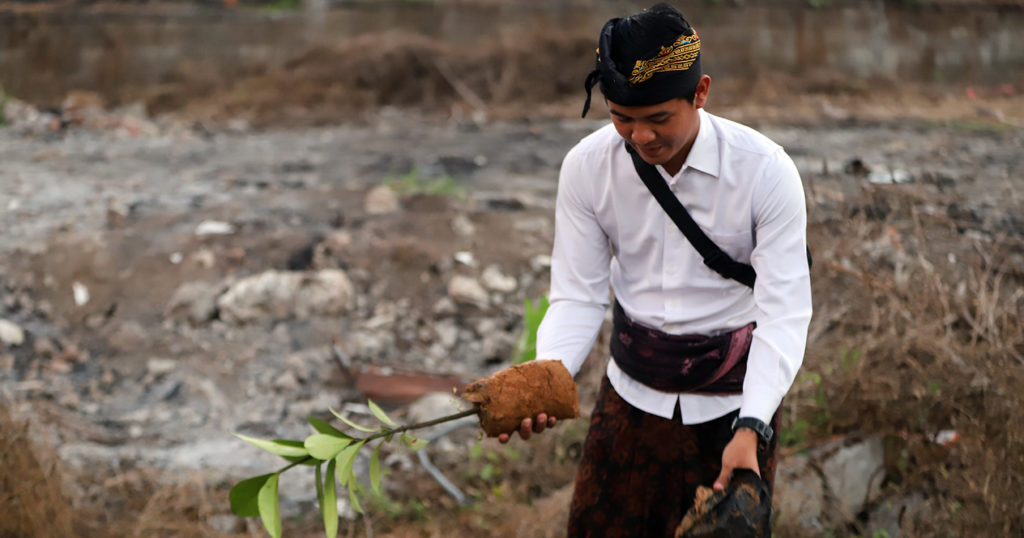
With climate change intensifying the ferocity and frequency of natural disasters—typically in regions where the poor are disproportionately affected—how do we as the Church respond?
That was the question posed at UnitingWorld’s annual conference of Southeast Asia Partners, held in Bali from 29 July to 2 August 2019.
Delegates from Bali, Java, Maluku, West Timor, Timor-Leste, Papua and West Papua and North Luzon in the Philippines gathered to hear from experts and share their own experiences of climate change and disasters.
Indonesian disaster specialist Henry Pirade led sessions with project managers on how to conduct risk assessments, prepare local communities to be disaster ready and how to carry out effective disaster response.
Delegates enthusiastically shared their experiences of disasters and gathered ideas from one another to take back to their churches and disaster preparation projects.
“As the Church, it is our calling and responsibility to protect the most vulnerable in our communities,” said Rev Sudiana, director of UnitingWorld partner Maha Bhoga Marga (MBM), an agency of the Christian Protestant Church of Bali.
“But there is often apathy in local communities when it comes to disaster preparation. If it’s not a priority for local government, it needs to be pressed by local churches. We are good at helping after disasters, but we can save many more lives in advance if we prioritise disaster planning.”
Delegates discussed how disaster preparedness needs widespread and diverse community buy-in to prevent vulnerable groups like the elderly and people with disabilities from being left behind during a disaster.
Many delegates spoke about the critical roles of education and leadership in keeping people safe during disasters and preparing for climate change.
“The key to mobilising our communities for climate action and disaster preparation is education. People won’t move if they don’t understand the situation and their role in it,” said Julius Cezar, a youth leader from the United Church of Christ in the Philippines.
“We must empower our [project] beneficiaries to become leaders of disaster preparedness in their communities. Education is often the only difference between beneficiary and a leader,” said program manager Victor Nahusona from the Protestant Church of Maluku.
The conference highlighted how supporting people during disasters isn’t only practically difficult but can also be psychologically and spiritually complex.
“For weeks after the recent flood in Sentani (Papua), people who had fled their flooded islands were scared to go home or fish in the lake because they had seen dead bodies in the water around their houses,” said program manager Meilanny Alfons from Papua.
Physically removing and burying the bodies is one thing, addressing the trauma and fear of spirits is another. Delegates agreed the Church has a strong role to play in trauma counselling.
“Christian hope is a call to action.”
Keynote speaker Rev James Bhagwan spoke about the pastoral role of churches and shared his experiences of faith-based climate action and disaster response in Fiji.
Rev Bhagwan didn’t avoid difficult theological questions: Where is God in a crisis? Who is to blame? How do our communities respond faithfully and effectively?
Drawing on an emerging Pasifika theology of climate justice, Rev Bhagwan pointed to God’s love as the starting point for climate action.
“Biblical justifications for climate action need look no further than the Bible’s most known and quoted verse, John 3:16.”
For God so loved the world that he gave his only Son, so that everyone who believes in him may not perish but may have eternal life.
“When the Spirit became flesh and dwelt among us, it signaled that God is with us, and showed what love for the world truly looks like. This is the starting point for a theology of climate justice,” said Rev Bhagwan.
“As we lose our relationship with creation and deny the sacredness of all life it becomes easier to exploit it.”
Rev Bhagwan explained the theological justifications holding back climate action in the Pacific, and many of the Southeast Asia delegates noted the same debates going on in their churches.
“In the Pacific, people often see disaster preparation and climate action as showing lack of faith (‘God looks after us’). But preparedness is practicing faith. It is a visible proclamation of hope for a renewed tomorrow.”
“Christian hope is a call to action.”

The Protestant Christian Church in Bali, the local hosts of the UnitingWorld Partner Conference, made space on their land for each delegate to plant a tree for their own church or church agency. The trees represented a commitment to work in partnership for climate justice.
As part of our commitment to standing with those most vulnerable to climate change, the Uniting Church in Australia is encouraging members to support the Global Climate strike on September 20.
Click here to support the Global Climate Strike and join us on 20 September!
The conference was kindly hosted by Maha Bhoga Marga (MBM), the development agency of our partners the Protestant Christian Church in Bali.
